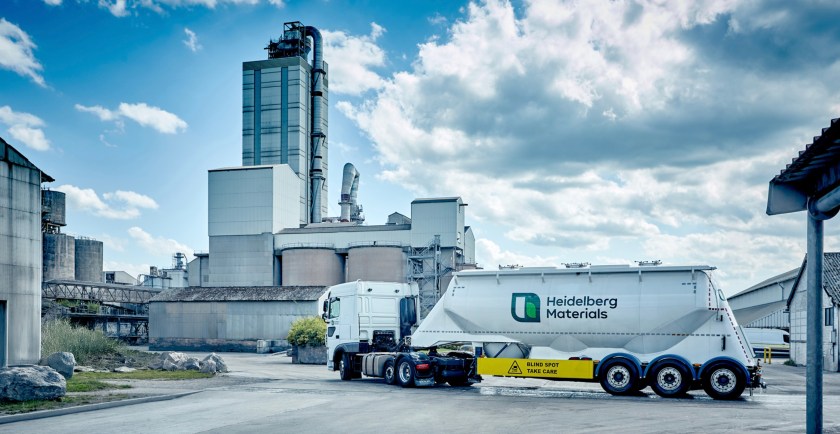Business
Padeswood’s Groundbreaking Carbon Capture Cement Plant Set to Transform Industry

A pioneering carbon capture project has been approved for the Padeswood cement works in Flintshire, marking a significant milestone as it will operate as the world’s first fully decarbonised cement plant. Construction is slated to begin later in 2025, with the facility expected to secure over 200 existing jobs and create an additional 50 permanent roles, while supporting up to 500 jobs during the construction phase.
This innovative facility, known as the Padeswood Carbon Capture and Storage (CCS) plant, aims to capture approximately 800,000 tonnes of CO2 annually—effectively eliminating nearly all emissions from the site’s current cement kiln. The plant will produce evoZero, the world’s first net zero cement, with production anticipated to commence in 2029.
Significant Economic and Environmental Impact
Simon Willis, CEO of Heidelberg Materials UK, expressed enthusiasm regarding the project, stating, “Our constructive partnership with the UK Government has allowed us to reach this major milestone, which is fantastic news, not just for us, but for the industry as a whole.” He emphasized that the new facility will position Padeswood as a leader in sustainable cement production, facilitating the UK construction industry’s decarbonisation efforts.
The captured CO2 will be compressed and transported via an underground pipeline for permanent storage beneath the seabed in Liverpool Bay, integrating with the HyNet North West carbon capture cluster. This initiative is expected to yield significant economic benefits for Flintshire and the wider North Wales region. Heidelberg Materials plans to prioritize local supply chain contracts and aims to maximize training and employment opportunities for the community.
Local politicians have welcomed the announcement. Alyn and Deeside MP Mark Tami highlighted the importance of this project in the context of the UK Government’s £9.4 billion investment in industrial areas, stating, “We have an excellent and capable workforce here in Flintshire and I’m delighted that we will be at the forefront of the UK’s green growth.” Clwyd East MP Becky Gittins also described the project as a “huge boost” for the region, affirming its role in creating sustainable jobs while significantly reducing emissions.
Understanding the Need for Carbon Capture
The production of cement is essential for construction globally, yet it is responsible for substantial carbon dioxide emissions. Unlike other sectors, these emissions stem from chemical processes inherent to cement production, making it impossible to eliminate them solely through a transition to renewable energy sources. The Padeswood facility aims to capture around 95% of emissions from the cement kiln, a critical step towards achieving net zero cement production.
Some of the fuels used at the plant will come from biomass sources, such as food and wood waste, potentially enabling the plant to produce cement that is “net negative,” meaning it could remove more carbon from the atmosphere than it emits.
The Padeswood project is part of a broader strategy to establish anchor CCS projects within the HyNet North West network. Alongside a waste-to-energy facility at Protos in Ellesmere Port, these projects will collectively capture 1.2 million tonnes of CO2 annually, supporting around 500 skilled jobs, with an additional 2,800 jobs expected across the wider HyNet cluster.
Heidelberg Materials has experience in this field, operating a carbon capture plant in Brevik, Norway, which opened earlier this year and captures about 50% of CO2 emissions under the Norwegian government’s Longship programme.
The UK Government has identified the Padeswood project as central to its Industrial Strategy, with a commitment of £9.4 billion towards CCS and clean industry initiatives throughout the current parliamentary term.
Looking ahead, the Padeswood facility is set to become operational in 2029, representing a significant advancement in the global cement industry while contributing to the UK’s emission reduction targets. Mark Burrows-Smith, Chief Executive of Encyclis, which is leading the Protos project, noted that this initiative enables essential waste treatment services while reducing carbon emissions and fostering the creation of skilled jobs.
Olivia Powis, CEO of the Carbon Capture & Storage Association, emphasized the importance of these projects, stating they will “secure the future of essential UK industries and keep businesses competitive in global markets.” The Padeswood carbon capture project stands as a testament to the UK’s commitment to a sustainable industrial future, showcasing local expertise in the global clean energy revolution.
-

 Entertainment3 months ago
Entertainment3 months agoAnn Ming Reflects on ITV’s ‘I Fought the Law’ Drama
-

 Entertainment4 months ago
Entertainment4 months agoKate Garraway Sells £2 Million Home Amid Financial Struggles
-

 Health3 months ago
Health3 months agoKatie Price Faces New Health Concerns After Cancer Symptoms Resurface
-

 Entertainment3 months ago
Entertainment3 months agoCoronation Street’s Carl Webster Faces Trouble with New Affairs
-

 Entertainment3 months ago
Entertainment3 months agoWhere is Tinder Swindler Simon Leviev? Latest Updates Revealed
-

 Entertainment4 months ago
Entertainment4 months agoMarkiplier Addresses AI Controversy During Livestream Response
-

 Science1 month ago
Science1 month agoBrian Cox Addresses Claims of Alien Probe in 3I/ATLAS Discovery
-

 World2 weeks ago
World2 weeks agoBailey Announces Heartbreaking Split from Rebecca After Reunion
-

 Health4 months ago
Health4 months agoCarol Vorderman Reflects on Health Scare and Family Support
-

 Entertainment4 months ago
Entertainment4 months agoKim Cattrall Posts Cryptic Message After HBO’s Sequel Cancellation
-

 Entertainment3 months ago
Entertainment3 months agoOlivia Attwood Opens Up About Fallout with Former Best Friend
-

 Entertainment2 weeks ago
Entertainment2 weeks agoCoronation Street Fans React as Todd Faces Heartbreaking Choice





















